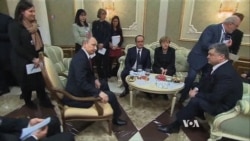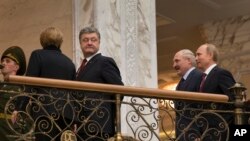The leaders of Ukraine, Russia, Germany and France emerged from marathon talks in Belarus Thursday with a cease-fire deal aimed at ending months of fighting that has killed thousands in eastern Ukraine.
The cease-fire, which will begin Sunday, was announced following 16 hours of grueling, all-night talks in the Belarussian capital, Minsk.
Russian President Vladimir Putin said the parties "have managed to agree on the main issues," including the withdrawal of heavy weapons from the conflict area.
Ukraine Ceasefire Deal
Ukraine Ceasefire Deal
- February 15: Ceasefire begins
- February 17: Heavy weapons to be pulled out, completed in two weeks
- All prisoners to be released
- Withdrawal of all foreign armed formations, weapons and mercenaries from Ukrainian territory. Disarmament of all illegal groups
- Ukraine to lift restrictions, allow resumption of normal life in rebel areas
- Constitutional reform to enable decentralization for rebel regions by end of 2015
- Ukraine control of border with Russia to be completed by end of 2015
Ukrainian President Petro Poroshenko hailed the truce deal.
"The main thing which has been achieved is that from Saturday into Sunday there should be declared, without any conditions at all, a general cease-fire," Poroshenko said.
Pro-Russian rebels, who were not directly represented at the four-way talks, were also reported to have accepted the deal.
But all sides stressed, in separate news conferences, that disagreements remain.
"We have no illusions," said German Chancellor Angela Merkel, adding there is "very, very much work to be done."
US welcomes deal
Meanwhile, the United States has hailed the agreement as one that “represents a potentially significant step toward a peaceful resolution of the conflict and the restoration of Ukraine’s sovereignty….”
Recognizing the “tireless efforts” of German Chancellor Merkel and French President Hollande, a White House statement issued Thursday calls on Russia to “end its support for the separatists and withdraw its soldiers and military equipment from eastern Ukraine.”
“The true test of today’s accord will be in its full and unambiguous implementation, including the durable end of hostilities and the restoration of Ukrainian control over its border with Russia,” the statement says.
Was Putin cornered?
There is speculation that Putin was cornered into a deal by a rising fallout in Russia from Russian citizens dying in the fighting in eastern Ukraine. Kyiv claims many of them are soldiers. Officially denying the presence of troops, Moscow says if there are soldiers involved in the fighting, they are there as volunteers and on their own time.
Even as the cease-fire was unveiled Thursday, Ukrainian military officials said more tanks and heavy weapons had crossed into Ukrainian territory from Russia overnight.
"Contrary to statements by top officials of the Russian Federation who insist that there is no Russian military equipment or troops on Ukrainian territory, we observed... new transfers across the Russian-Ukrainian border of 50 tanks, four dozen multiple launch rocket systems… and the same number of armored vehicles," said Kyiv military spokesman Andriy Lysenko.
Russia has been denying sending troops or weapons across the border to aid in the fighting between pro-Russian separatists and Ukrainian forces that has killed at least 5,400 people and wounded thousands more.
No 'federalization'
Poroshenko, who said there was a "great deal of tension" in the talks, denied any agreement was reached on autonomy for the largely Russian-speaking eastern regions no held by separatists.
Putin said the accord included a Ukrainian commitment to provide constitutional guarantees of what he called “the rights of the people” in the rebel-controlled areas of Ukraine's Donetsk and Luhansk regions
Ukraine’s new government has long offered substantial autonomy for the regions. But Poroshenko said it will not go as far as Russia and the rebels want.
“Despite Russia’s insistence, we did not agree on any status of autonomy. We will do this through constitutional reforms, decentralization that will involve the whole country. We did not agree on ‘federalization,'" Poroshenko said.
The agreement reached in Minsk also calls for the withdrawal of heavy weapons from the front lines, the establishment of a 50-kilometer line of separation and constitutional reform for broader self-rule in the restive regions.
U.S. President Barack Obama has said he will await the outcome of the summit before deciding whether to supply Ukraine with weapons to allow Ukrainian government forces better defend themselves.
The negotiations were an attempt to revive a cease-fire that was originally agreed to in September but which quickly broke down.
The summit took place against the backdrop of fierce fighting in eastern Ukraine, described by those on the ground as some of the most intense and deadly combat yet seen in the conflict.
Sanctions
Meanwhile, European Union foreign policy chief Federica Mogherini said she did not expect EU leaders to discuss sanctions on Russia at their summit on Thursday after a Ukraine cease-fire was agreed in talks in Minsk.
Mogerhini called the Minsk agreement important but not definitive.
"I don't think today we will discuss sanctions," she said. Talks would focus on how to "activate all possible EU means" to help preserve the cease-fire deal once it was in place.
As news of the new Minsk deal was announced, the International Monetary Fund offered Ukraine a $17.5 billion lifeline the country desperately needs to avoid bankruptcy.
The four-year deal could include as much as $40 billion in funding when combined with money from other lenders.
An IMF delegation has been in Kyiv since January hammering out the new bailout package.
Russian stocks surged on the news of the Minsk deal as the ruble regained some value, but the dropped again.
VOA's Al Pessin contributed to this report from London. Some material came from Reuters.







